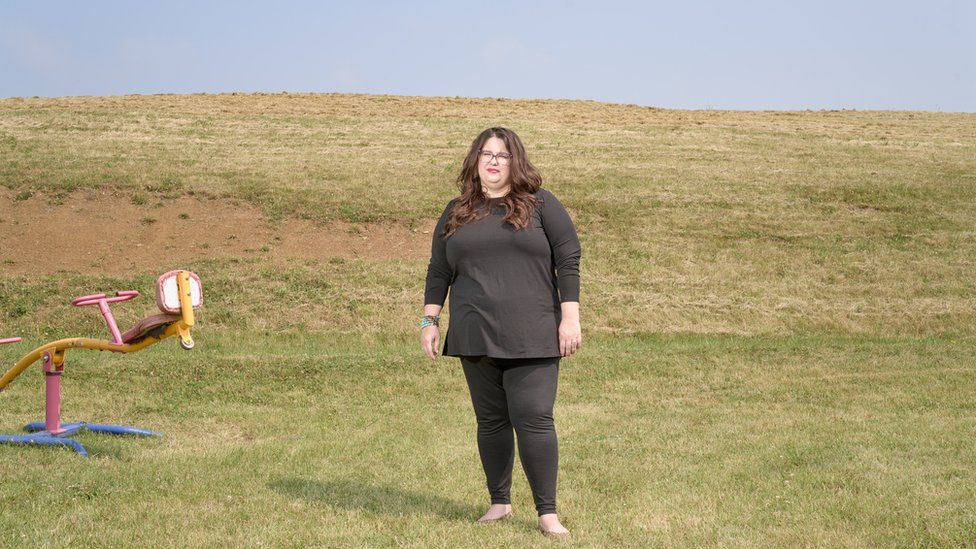At the age of 23, Kristan Hawkins began to sleep in her office.
It took her organization, Students for Life of America (SFLA), several years before it rose to prominence as one of the biggest and most effective anti-abortion organizations in the nation. And it took her more than ten years to finally declare to her jubilant supporters that the right to abortion had been abolished nationwide as she stood in front of the US Supreme Court.
But in 2008, the SFLA's main office was in Arlington, Virginia, and Hawkins and her husband had to travel 90 minutes to get to the nearest town where they could afford to buy a home.
She tried the commute at first, leaving at 5 am and coming back at 8 pm. But the distances traveled increased and gas prices increased.
She decided to buy a cheap loveseat from Ikea because she believed she could work for two days and 30 hours straight before returning home for the night. She used the new couch for naps and a nearby Gold's Gym for showers. Hawkins purchased an eye mask and began sleeping with the lights on when she discovered that the office was also home to cockroaches in order to keep them away.
Only two years into their marriage, Jonathan, her husband, recalled that time as "terrible, terrible.".
However, Kristan Hawkins was unrelenting. Additionally, she had a task to complete: she had to witness the overturning of Roe v. Wade, which had upheld the country's long-standing right to an abortion.
She was successful in June. According to pro-choice activists, her activism since then has already contributed to denying access to abortion to about 18 million women and has caused a public health emergency in the nation.
Hawkins, however, has set a new, more ambitious objective: she wants to make abortion both illegal and unthinkable throughout the US.
Hawkins has gone into overdrive in the year since Roe was overturned, expanding the scope and size of SFLA and using that influence to persuade state legislatures to enact increasingly strict bans.
As everyone in America is watching, "pump the gas pedal down on everything, right now," she said, "that's the momentum thing, right? I want more, more, more, more. " .
As a new generation of activists work towards their ultimate goal—a federal abortion ban that starts at conception—Hawkins, who is now 38, is more brash and unyielding than their forebears.
Mary Ziegler, a law professor at the University of California, Davis, and a recognized authority on the US abortion debate, said of her as "she's representative of the rightward shift in the movement... and how far the movement can go.". To comprehend what happens next, knowledge of Kristan is crucial. ".
Even some Republicans believe Hawkins is going too far, too quickly with her plans because the majority of Americans support access to legal abortion.
But Roe's overturning was also once viewed as unlikely. Hawkins is confident that she will lead the anti-abortion movement to yet another unlikely victory one year after it was defeated.
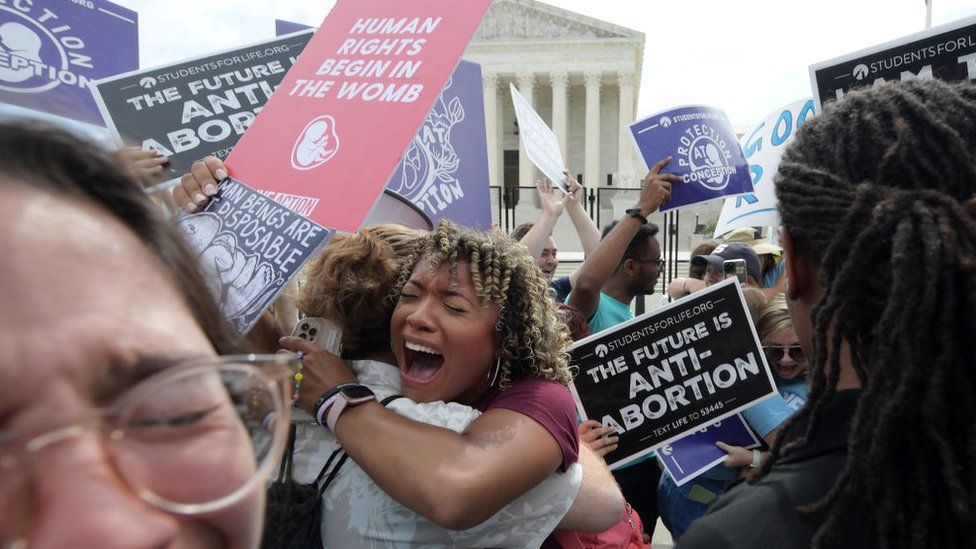
The majority of pro-lifers have a origin story, a turning point that they claim inspired them to pursue their cause.
When Kristan Hawkins was 15, she had her breakthrough. She began working as a volunteer in her home state of West Virginia at a crisis pregnancy center, a facility that discourages women from getting abortions by offering pro-life counseling, ultrasounds, and practical supplies like diapers and wipes.
Hawkins had to educate herself on abortion and come to terms with what it looked like before she was permitted to begin working. She received a VHS tape of the Silent Scream, a contentious 1984 anti-abortion propaganda movie that claimed to depict an ultrasound of a distressed fetus during an abortion at 12 weeks. The movie has been criticized as a fraud by pro-abortion activists because it contradicts findings from eminent scientists who claim that a fetus cannot feel pain until it is at least 24 weeks pregnant.
However, Hawkins was appalled. She couldn't believe it, too. She believed that the routine killing of "preborn babies," as she refers to fetuses, was the greatest human rights atrocity of our time. Therefore, why didn't everyone try to stop it?
She recalled leaving the pregnancy center on her first visit, thinking, "Oh my God, how is life going on as normal when this is happening?" in an interview in May. "That caused a complete change. " .
Hawkins founded Teens for Life, a local pro-life organization, after spending the summer working at the clinic. She joined the local Republican chapter as well as the Right to Life chapter. She remarked, "I was the youngest there by about four decades.".
Hawkins was hired to lead Students for Life in 2006, a fledgling organization at the time with groups on 180 campuses, after graduating from college and serving brief stints at the Republican National Committee and the Department of Health and Human Services. 21 was her age.
Hawkins is still prone to sending coworkers texts and emails at all hours, even after seventeen years. With over twenty meetings and commitments blocked off in overlapping time slots, her daily schedule, as entered into her iPhone, is a nightmare. Sometimes a health coach will call her during the day to interrupt her. They're attempting to convince me to drink water, she explained. I frequently make the joke that Diet Mountain Dew is the foundation of Students for Life. ".
The entire family resides in an RV with her and Jonathan so they can accompany her on her frequent SFLA outings. Homeschooling is offered by Jonathan, a former teacher.
During a recent family trip to the Pittsburgh Zoo, Jonathan remarked, "I just go with the flow; that's all you can do.".
Later that day, Kristan remarked, "I think you're sick of the word abortion.". I swear I can see you twitch sometimes when I say it. ".
Hawkins is sarcastic and frequently turns to humor when interacting with supporters and donors, a sometimes unexpected habit from a person who is working to outlaw abortion completely. She also yells a lot and flinches while speaking. She claimed that, "in the conventional sense," she doesn't have any friends.
What would I talk about besides ending abortion with my lack of girlfriends at brunch, she asked.
Hawkins is fully aware of how time-consuming her mission—which she gave birth to that day at the pregnancy center—has become. The DBW principle, which stands for "don't freak people out," has been attempted to be instilled in her team.
She said, "You have to know when to show your passion. Some people are going to be pretty upset with you if you show them the graphic photos in your pocketbook of aborted children at the dinner table. " .
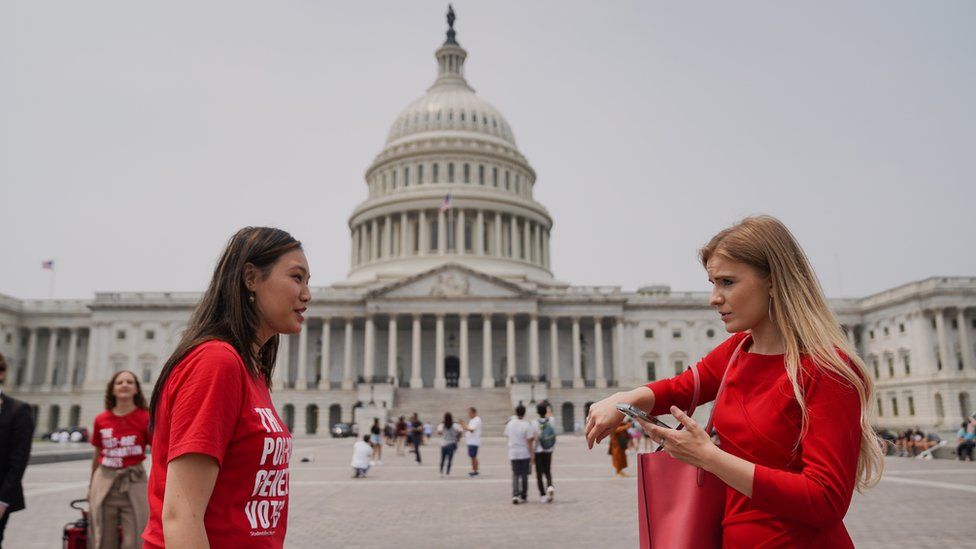
Six Students for Life members arrived at Capitol Hill prepared to lobby on a soggy June day in Washington, weaving through crowds of youths on field trips and tour groups wearing matching t-shirts.
The phrase "The Pro-Life Generation VOTES" was emblazoned across their chests in a cheery warning. They were all dressed in red, half of them sporting SFLA apparel. One was sporting a pair of tiny gold hoops with dangling posts that were intended to resemble the size of a 12-week-old fetus' foot. It provides a glimpse into their humanity, she claimed.
There are organizations like this all over the US, including at state legislatures and on college campuses. Under Hawkins, SFLA expanded to more than 1,400 campus groups in 50 states, which are now managed by 80 paid staff members. More than 160,000 anti-abortion campaigners have completed SFLA training since 2006. According to experts, Hawkins' unique strength is her ability to mobilize the public; activists from the SFLA are now a mainstay at anti-abortion rallies across the nation.
We established SFLA to represent the post-Roe generation, she claimed. "That trained army was going to be ours. " .
And following the overturn of Roe last year, that army has reorganized, aiding in the passage of numerous anti-abortion laws in state legislatures. 13 Republican-controlled states have banned abortion so far. At least six other state bans are indefinitely on hold pending legal challenges.
According to the Guttmacher Institute, a pro-choice research organization, almost one-third of American women of reproductive age now reside in states where abortion is prohibited or severely restricted. A 10-year-old rape victim denied an abortion in her home state of Ohio and 13 women in Texas who claim they were denied abortions despite life-threatening pregnancy complications are just two examples of the apparent consequences of these bans that have surfaced over the past year, further igniting support for abortion access.
According to Angela Vasquez-Giroux, vice president of NARAL Pro-Choice America, "What SFLA and other anti-abortion groups promote is the worst, most damaging, most criminalizing policy.". "She [Kristan] is the movement's epitome of extremeness. " .
She said, "You're making it risky to be pregnant in the United States.".
However, there is disagreement over the direction the anti-abortion movement will take now that Roe has been overturned. .
A foetus is a person with rights, according to Hawkins and the majority of other leaders. A federal ban on abortion is another goal they have in common. On how exactly to implement such a ban, however, as well as what it would look like, there is disagreement.
Mary Ziegler of the University of California stated that "the movement is really fragmented.". No agreement has been reached. " .
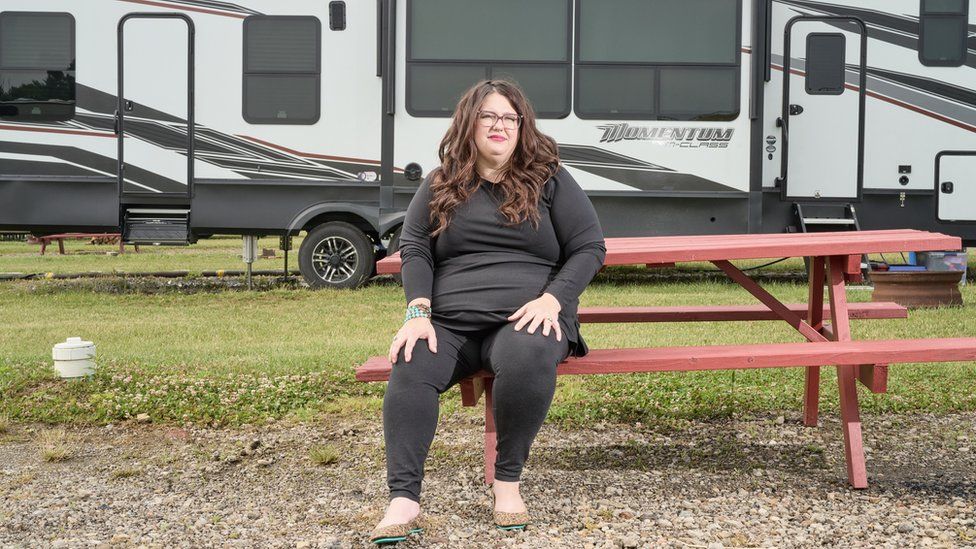
The SFLA has promoted what they refer to as an "early abortion model" by drafting and supporting legislation that outlaws abortion at conception or, at the very least, after early cardiac activity is discovered, which is typically around six weeks of pregnancy.
The incrementalism that shaped earlier iterations of the anti-abortion movement, and which is still favored by some of SFLA's peers, has thus been abandoned by Hawkins' organization.
SBA (Susan B. Anthony Pro-Life America) is one such organization. The leader of the SBA, Marjorie Dannenfelser, is a strong and well-known figure in the anti-abortion movement. She has stated that she will oppose any presidential candidate who does not support a 15-week national ban, a standard that is supported by 44% of Americans, according to a recent poll.
For Hawkins, that is insufficient. SFLA will only support candidates who support a federal ban at six weeks.
Hawkins acknowledges the tension. Marjorie is the insider, and I'm the outsider who says, "[Screw] it, we're just doing what we know is right," Hawkins remarked while using an expletive. "There is no fighting. ".
On other abortion-related issues, Hawkins is also more outspoken and overtly conservative. She is opposed to the rape and incest exceptions. She also opposes a variety of birth control methods, including oral contraceptives, a stance that one anti-abortion leader privately referred to as "unhelpful".
Elisabeth Smith, state policy director for the Center for Reproductive Rights, a pro-choice organization, stated that "what has changed is they are willing to say the quiet part out loud.". They are prepared to behave extremelly in public. " .
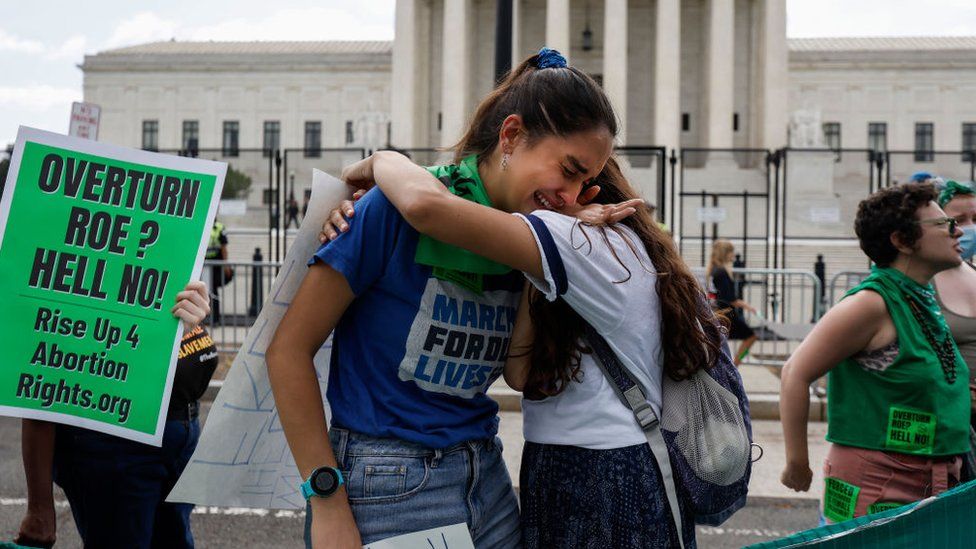
Republicans are concerned about Hawkins' rigid stance as well. Politicians are forced to decide between dissapointment of Hawkins and her supporters and alienation of a significantly more moderate electorate.
According to John Feehery, a former Republican congressional aide, Republicans are in a much more defensive position politically than Democrats because they frequently advocate for restrictions that the majority of Americans do not support.
Democrats won unexpected victories in a number of high-profile races in 2022 as a result of what appeared to be a collision between a predicted red wave and a surge in support for abortion rights. Pro-choice voters overwhelmingly supported all six abortion-related ballot measures last year, including in traditionally conservative states like Kansas and Kentucky.
Women are watching Republicans after Roe, and Nancy Mace, one of the few House Republicans who has publicly called for more abortion tolerance, told the BBC that anything short of a compassionate strategy to win back suburban women and swing voters would seriously set back the pro-life movement and the party as a whole.
The Republican party, however, is not Hawkins' issue. She has little patience for Republicans who do not support early bans and has threatened primary challenges against them.
Hawkins predicted that Merv Riepe, a Nebraska state senator who this year opposed a six-week ban, "is going to retire pretty soon.".
The same danger exists for South Carolina's three female Republican senators who voted against a total ban. A six-week suspension was backed by two, but Hawkins felt that was insufficient. Earlier this year, SFLA sent each of them a plastic infant-size spine along with a note advising them to develop a backbone.
The difference between us and other pro-life organizations, according to Hawkins, is that. "I really don't care if so-and-so in Washington, DC, doesn't like me. In my demographic, it doesn't even give me any points. ".
Her dominance among anti-abortion activists, who are now lurching to the right in the absence of Roe, has been fueled by that aggressive, unyielding approach.
According to Zelly Martin, a specialist in the US abortion debate and a researcher at the University of Texas' propaganda lab, "the movement as a whole is moving toward asking for more extreme bans.". "They feel that since Roe no longer protects abortion, why would we turn back, and I think Kristan Hawkins is a big part of that," says Hawkins. " .
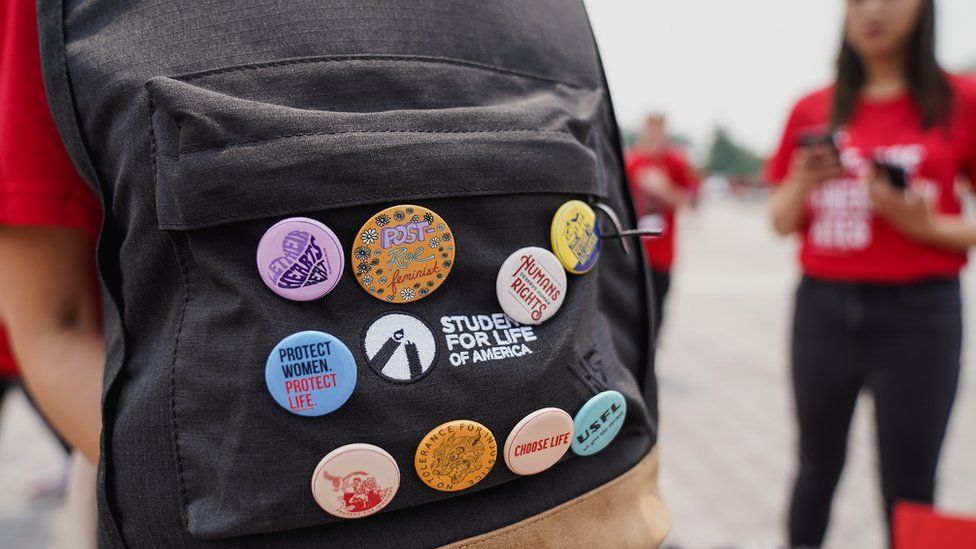
Uncertainty surrounds how far Hawkins will advance and how close to outlawing abortion she will actually be.
The American people, according to Ziegler, "will not want an outright ban on abortion at this point in American history.". "There isn't any evidence of that. ".
Hawkins and others, however, are looking into ways to get around both political opposition and public opinion, Zieger said. One, and possibly the most practical, would be to ask the conservatively inclined Supreme Court to recognize the constitutional rights of a fetus.
Although the odds seem slim, Hawkins is accustomed to them.
Hawkins was in a small conference room on the first floor of a building in Northville, Michigan, last month as rows of potential donors sat in front of her. She began by sharing a story from the beginning of her professional career.
Hawkins had received unsolicited advice from a pro-life mentor to stop referring to the date of Roe v. Wade's repeal as "when.". She sounded "too immature, too naive," he warned, by presuming Roe's demise.
Hawkins disregarded him. She instructed her team to increase their messaging that promised to consign Roe to the "ash heap of history," and to double down.
"Winners visualize the win, I always tell our team.
. "

